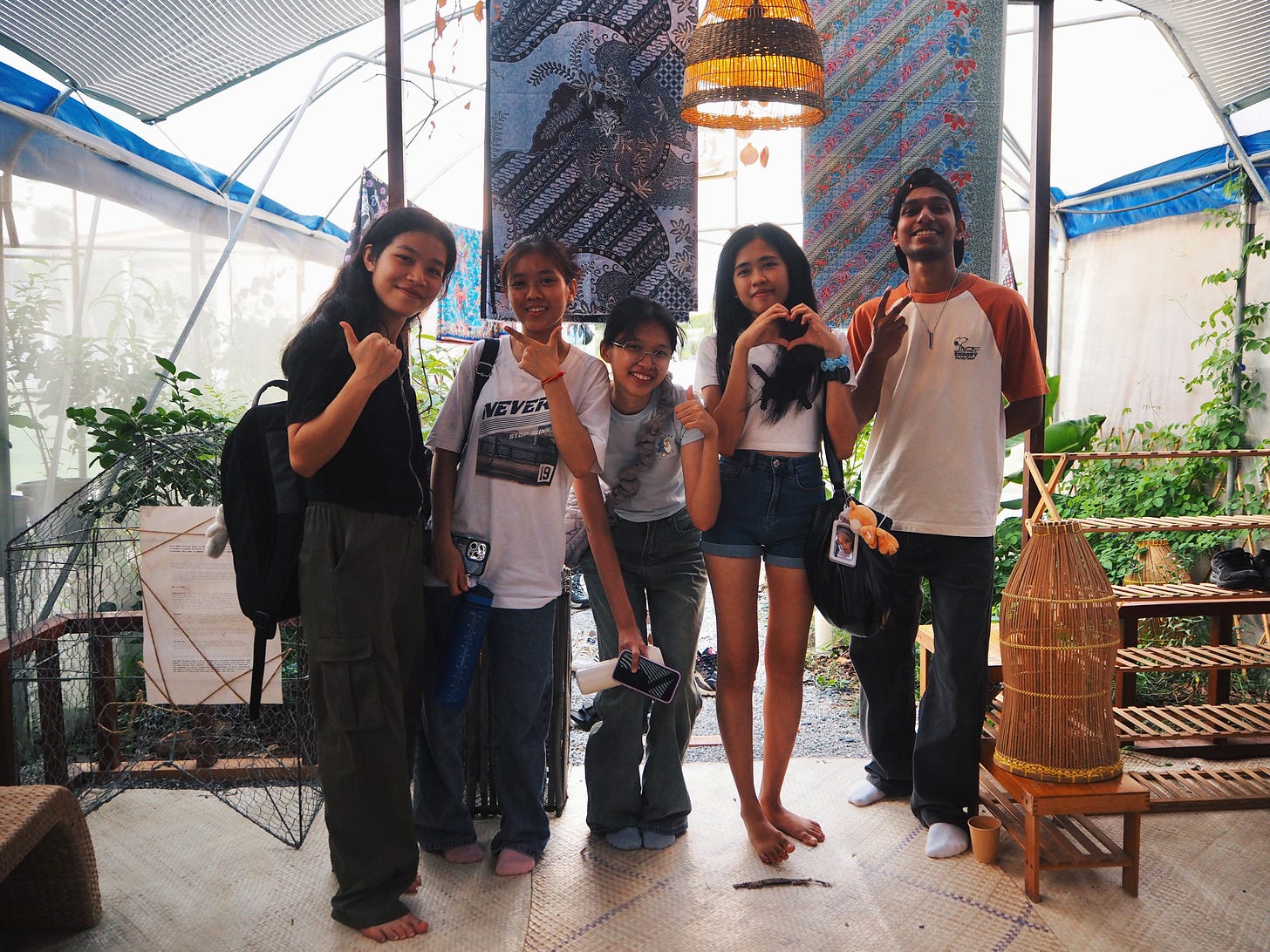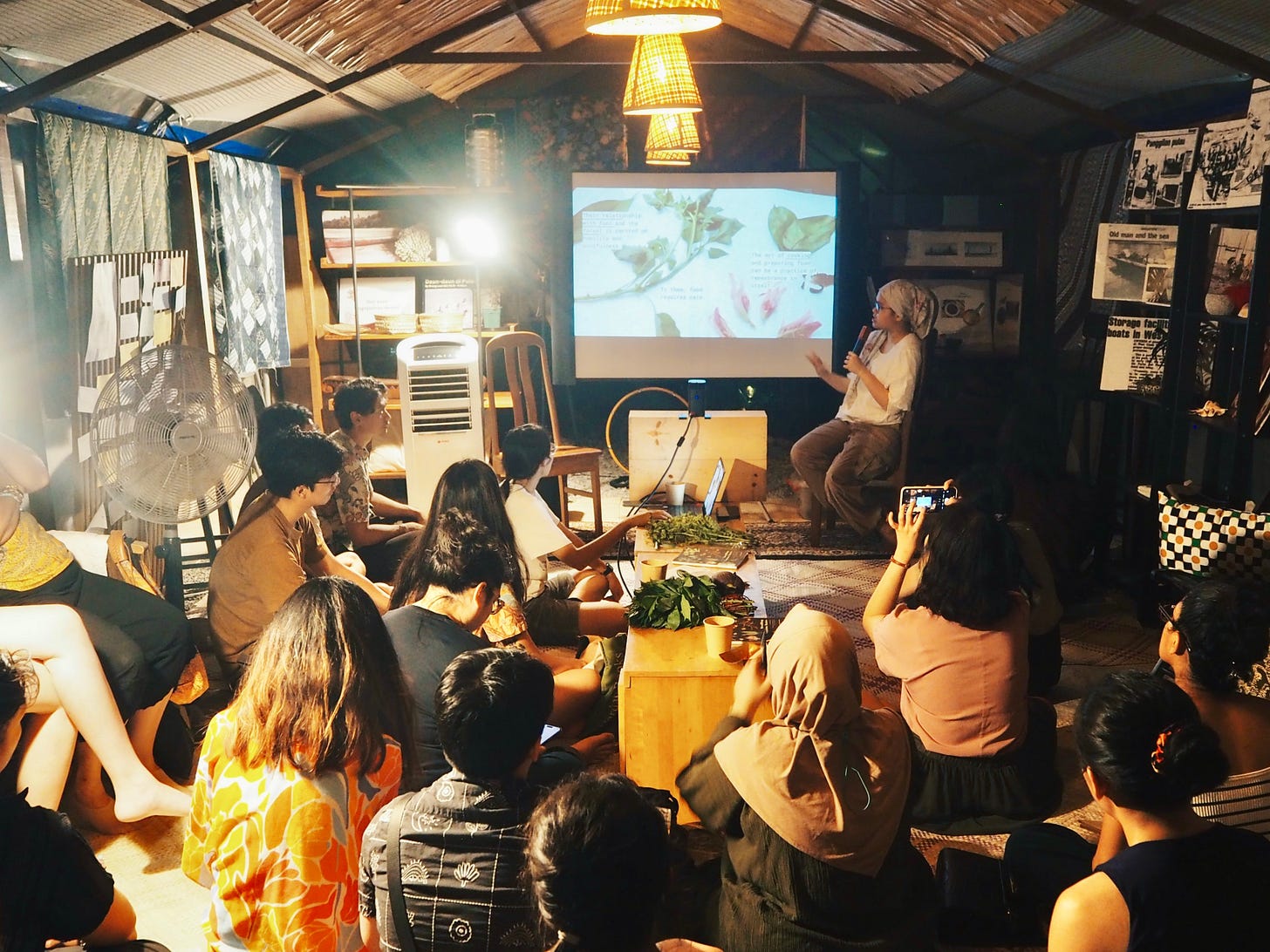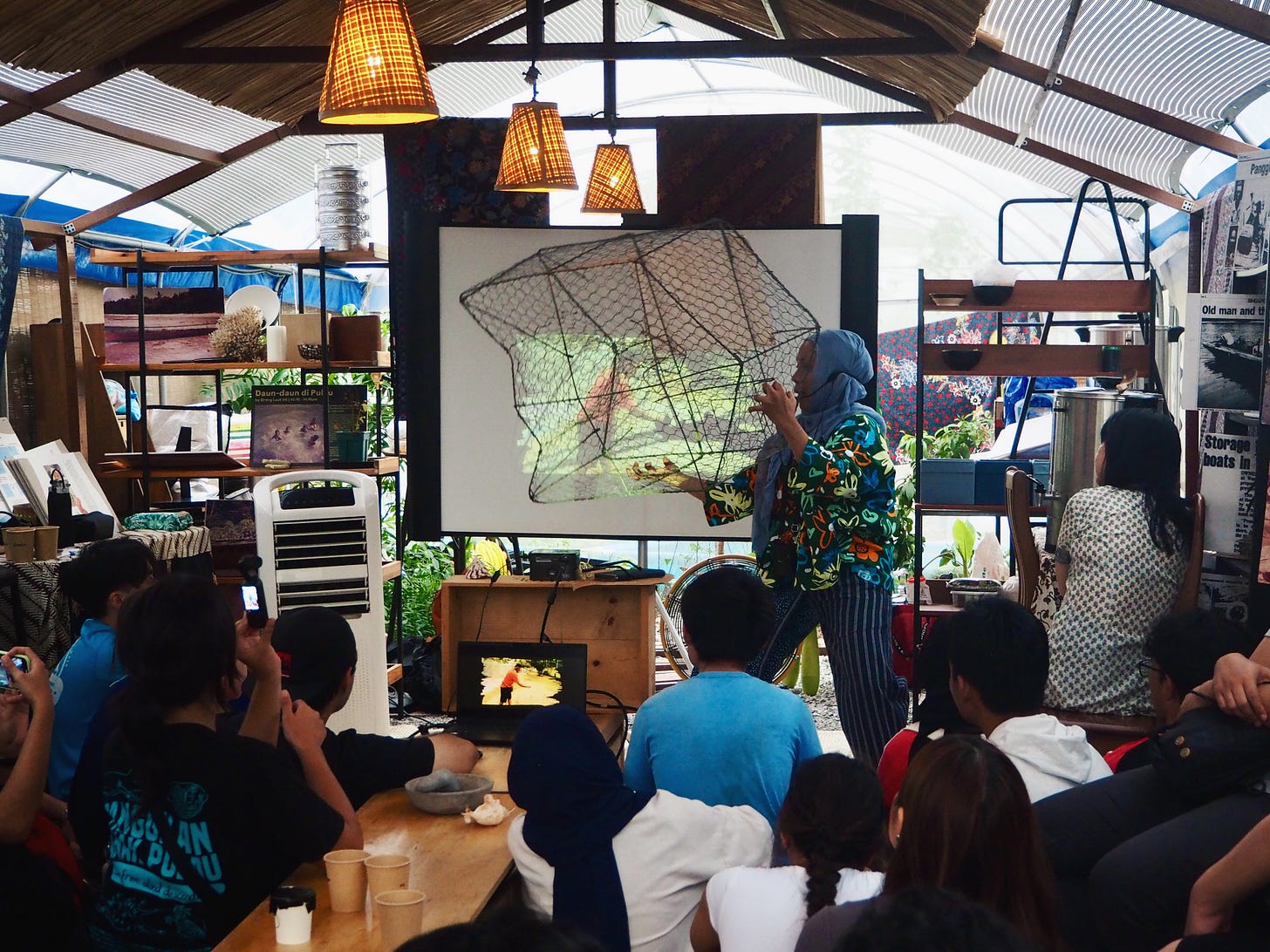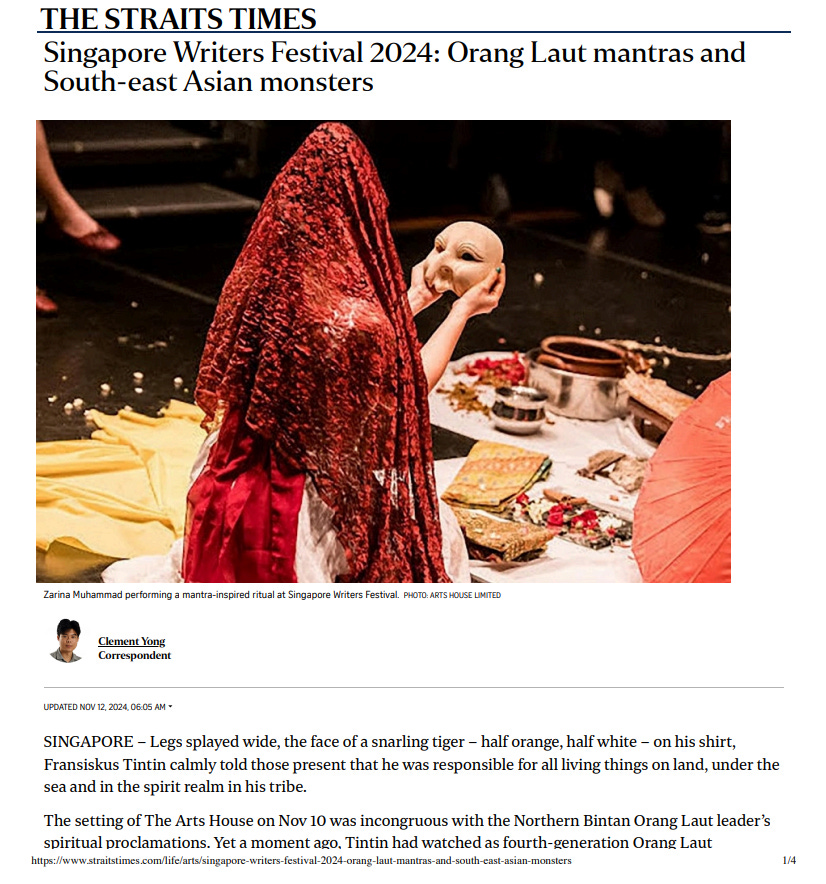If you’ve been following our stories (thank you!), you may have seen that parliamentary questions were raised about conserving our last remaining community space at West Coast Park, and integrating Orang Laut / Pulau history into Singapore’s cityscape in light of upcoming developments in coastal areas such as the Greater Southern Waterfront, Kallang Basin and Pulau Brani.
Building on this progress, we recently hosted Minister Desmond Lee, along with representatives from NParks, URA, and MND, at the community space last week. There, they spoke to some of our community elders and descendants of the Southern Islands. These conversations brought to life linguistic nuances, maritime crafts, and other unique practices, all shared over warm bowls of homecooked Bubur Lambuk Ikan Tenggiri, our community’s speciality spiced mackerel porridge.
In the past, communities at West Coast Park have been vilified by the public and the media for the “unsightliness” of the shacks and boats, leading to the restriction of the space to a small section of the coast. Notably, not all the fishermen at West Coast Park are part of the Orang Laut/Pulau community, as some of the islanders had sold their boats to fishermen hobbyists due to the high costs of upkeeping. However, the space has been used and cherished by the Southern Islander community since their relocation to mainland Singapore in the 1970s, and it is heartening that its importance is finally being more widely recognised.
As many of the fishermen are also community elders, we hope that the space will swiftly be improved to ensure their comfort and safety—such as protection against rising tides, better storage facilities, enhanced access to electricity, and improved waste removal options.
Beyond these physical upgrades, there is an urgent need to recognise the immense cultural and ecological knowledge they hold that is currently at risk of disappearing in Singapore. Thus, Orang Laut SG has been collaborating with former islanders, descendants, and researchers to develop a comprehensive set of recommendations to share.
These possibilities draw inspiration from international efforts where discussions on Indigenous heritage and identity have been ongoing for much longer. Examples include initiatives like establishing Indigenous learning centres, renaming significant spaces to reflect their original, pre-colonial names, and restoring cultural landmarks—offering a glimpse of what Singapore could consider in our context.

Closer to home, we have been in touch with the islanders of Pulau Rempang, who have been resisting forceful evictions by the Indonesian government to undertake the Rempang Eco-City project since last year. This project attempts to establish an industrial zone for the processing of quartz sand for solar panel production in Batam. Its main investor is a Chinese glass-producing company, Xinyi Glass.
We want to provide an update on the situation written by members of Students for A Fossil Free Future (S4F), who have been working closely with the islanders and hosting fundraisers, which we have shared in previous newsletters:
Pulau Rempang consists of 16 kampungs and over 7,500 islanders, including indigenous Malays, Orang Laut and Orang Darat and others that have lived there for over two centuries. After attempted forceful evictions by the military in mid-2023, residents of Rempang clashed with police in Batam City on September 11th, 2023, leading to the arrest of 34 people. Findings from the National Commission on Human Rights (Komnas HAM) and preliminary investigations by the National Solidarity Coalition for Rempang revealed that the incident was declared a human rights violation as stipulated in Law No. 39 of 1999 on Human Rights as evidenced by the use of tear gas during clashes. The political prisoners were released earlier this year, with 21 released on 26 March 2024, and 11 released on the 31st of March 2024. According to members of S4F, many of the released islanders were mistreated in prison, stating lack of access to basic necessities such as food and soap.
After the government failed to evict residents from their villages, they offered to relocate the residents to Galang Island, offering land and houses. However, as one resident of Kampung Sembulang stated,
For the islanders of Pulau Rempang, their histories, cultures, and livelihoods are embedded in Rempang. As one islander shared with a member of S4F who visited Rempang in October 2024, “I was born here, I will die here, my ancestors are buried here, and I don’t want to be buried anywhere else.”
Currently, residents in Pulau Rempang still receive frequent visits from police, citing intimidation and violence. On 17 November, residents witnessed a lorry and three cars “full of hired thugs” allegedly on their way to break down houses in Sembulang Camping, the same week that an Indonesian government official announced it would demolish 44 abandoned houses in Pasir Panjang whose residents have relocated. Sembulang Camping, however, was not engaged in similar negotiations nor was this communicated to its residents.
Despite continued pressure to leave, many residents in Pulau Rempang choose to stay and defend their villages literally by guarding the entrances to their kampungs, but also through new fishing and farming cooperatives that aim to strengthen relationships to the land and sea and also build financial security for them. Read more about these initiatives, along with a breakdown of the funds usage from the fundraiser, on S4F’s Instagram.
Orang Laut SG stands in solidarity with the residents of Pulau Rempang, recognising their resilience and right to their native homes. As a ground-up initiative led by descendants of Southern Islanders, we understand the necessity of preserving ties to land, sea, and culture that define a community, and will continue to support their efforts in our capacity.
As part of our continued efforts to celebrate and sustain the stories, traditions, and livelihoods of the Orang Laut / Pulau communities, here’s what we’ve been working on recently!
We kicked off the month with two visits from the students of Temasek Polytechnic to West Coast Park, where we conducted a guided walk, Cik Am taught them the basics of bubu and jong making, and we all got to enjoy a performance blending music, poetry and memory by the phenomenal Asnida Daud.
To end of each session, we shared traditional snacks prepared by Mdm Nooraini, a former Pulau Semakau Islander; some visiting students eagerly shared the similarities some of the dishes had to their own culture’s cuisine, highlighting how culinary traditions can tell stories of the roots connecting Southeast Asian cultures, which borders cannot erase.

Ikut Arus (‘Follow the Current’) was performed at The Arts House for Singapore Writers Festival 2024 #swf2024. The performance explores the intricate ties that bind water, culture and nature together, while emphasising their symbolic, mythical and social significance.
The spoken word pieces were three original poems written by our Founder, Firdaus Sani, inspired by his grandparents’ mantras, honouring the hymns passed on from generation to generation. To some of the Orang Laut, mantras are often sacred, sometimes religious, and a particular power is evoked from this ancient practice the community often uses for healing and protecting people and spaces.
Firdaus and Zarina were then joined by Fransiskus Tintin (Head of Orang Suku Laut in Bintan) and Courtney Saville for a panel discussion to connect the performance to the lived experience of the Orang Laut communities. The interconnectedness of the Orang Laut groups in Singapore and Riau is clear, with shared cultures, practices, and beliefs that connect our islands by sea, as Tintin explained. Tintin is responsible for all life on land, water, and in the spiritual realm in his community, yet as he speaks on the panel in Bahasa Indonesia, he remains astoundingly humble.
Read the full article here.
This month, we also hosted our first Nio Series workshop at Tanah dan Air. Nio is the word our community uses for coconut, or kelapa, in contemporary Malay. The coconut is a vital resource to coastal communities across the region, with the tree and fruit’s incredible versatility earning it monikers such as pokok seribu guna (tree of a thousand uses) in Malaysia and kalpavriksha (a wish-fulfilling divine tree) in India. Likewise, the Orang Laut / Pulau community have unique uses for almost every part of the nio, reflecting how deeply sustainability is embedded in the community’s culture and age-old practices.
The Nio Series is a four-part workshop series by Orang Laut SG supported by the National Youth Council and National Heritage Board. The themes for each session are based on four different parts of the nio, with the first session, Sabut Nio (coconut husk), inspired by how the Southern Islanders used to collect the light and fibrous material to burn as firewood, fuelling daily life with a resource often overlooked today. For this session, we explored the theme of cultural sustainability and ways in which traditional knowledge may be passed down across generations.
Syarifah Nadhirah, author of Recalling Forgotten Tastes, shared stories about plants significant to the Orang Asli communities she worked with in Malaysia, such as pucuk ubi (tapioca shoots) and bunga jantang pisang (banana flower), key ingredients commonly found in Temuan cuisine. Her reflections reminded us of the rich histories held within the natural world and the importance of listening to the communities who have lived closely with these plants for generations.

Liz and Shirin from Wild Dot also spoke about the concept of “plant blindness”, which describes how urban living can dull our awareness of the plants around us. They invited us to reconnect with nature by foraging for natural pigments from the earth for their watercolour workshop, allowing participants to engage with nature in a creative and grounded way.
At the same time, we remain mindful of the critical role Indigenous communities play in preserving this knowledge, especially since many face urgent challenges, such as the degazetting of the Kuala Langat North Forest Reserve in Selangor. These threats impact not only biodiversity but also the cultural heritage deeply tied to these landscapes.
In future sessions of the Nio Series, we hope to carry on these conversations, dive deeper into traditional wisdom, and support efforts to sustain both cultural and environmental heritage. Thank you to everyone who joined us and we hope you had fun and learnt as much as we did!
We are also grateful to Darcel Anthony and Helmi Yusof, who recently featured our food in this article about Singapore’s edible heritage. For a taste of Southern Islander cuisine, we deliver a small amount of orders every weekend - you may check it out here!
What’s next for us? In December, we will be hosting our first-ever volunteer gathering at Tanah dan Air. Over the past events, we’ve had the pleasure of meeting many of you, and this gathering is an opportunity to connect on a deeper level in a casual, relaxed setting (where we’re no longer busy running around). Whether you’ve volunteered with us before or are new and curious about getting involved, everyone is welcome!
During the gathering, we’ll share more about our upcoming plans for 2025, and we hope it’ll be a chance to learn more about what we do, explore potential collaborations, or simply spend time with like-minded people who share a passion for culture and community. If you’d like to join us, simply indicate your interest via the button below and we’ll share further details soon. We look forward to seeing you there.
Before we close, we would like to take a moment to share some personal news. We are deeply saddened by the passing of Mdm Ninah Bte Gap, a former Pulau Semakau islander known fondly as Nenek Ninah within the Orang Laut/Pulau community. At 90 years old, she was a beloved mother, grandmother and great-grandmother to many, all of whom she held close to her heart. On 23 November 2024, she departed peacefully in the comfort of her home at Telok Blangah Drive, the very first flat she moved into from Pulau Semakau in 1977. She was surrounded by family and friends, people whose lives she touched deeply with her boundless generosity, kindness, and love, and who will carry her stories and teachings on for generations.
See you soon!
Orang Laut SG















